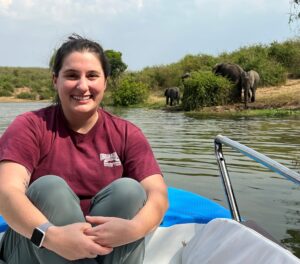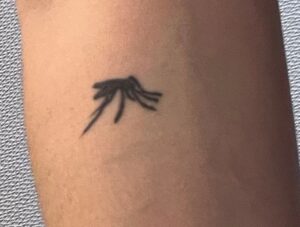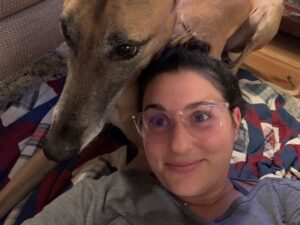Dana Giandomenico, MPH, CPH, REHS, is the program manager for vector-borne diseases. She joined the Institute in June 2021, to support Drs. Ross Boyce, Emily Ciccone, and others working in Uganda. Her office is currently in the Carolina Population Center, off Franklin Street, where Dr. Boyce has an appointment. In her free time, Dana enjoys being with her greyhound Miguel, a retired racer who was trained in a Florida prison to learn how to be a dog again. She also enjoys knitting.

Where are you from? Where did you go to school?
“My family is from Yonkers (the unofficial sixth borough of New York City). We were transferred to North Carolina with IBM when I was in kindergarten. I grew up in Cary and went to Western Carolina University, mainly for marching band but also to be in the mountains. I wanted to study environmental science and save the environment. “
Tell us about your path to infectious diseases.
“All freshmen at WCU have to take an intro seminar course and I took a public health course entitled “From Black Death to Bioterrorism.” It was so interesting that I immediately went to the professor and asked if it was possible to add environmental health as a degree. So, I ended up graduating with degree in environmental science and environmental health.
“As part of this, I had to participate in an internship for environmental health my senior year. My professor Dr. Brian Byrd—who we actually collaborate with now, and I blame for my obsession with mosquitoes—recommended I apply for the Mecklenburg County Mosquito Control program, which I did and I was hooked. I just loved working with mosquitoes.
“For graduate school, I planned to study industrial hygiene and occupational health, but after my internship, I wanted to pursue vector-borne diseases. I applied to the Global Communicable Diseases Program at the University of South Florida, College of Public Health in Tampa where I worked under Dr. Robert Novak, an incredibly gifted entomologist who passed away recently. In his lab, I gained valuable field experience in medical entomology. For what we refer to here at UNC as an MPH practicum, I traveled to Uganda to conduct research on mosquito ecology.”
Before joining the Institute, where did you work?
“I started my career as a health inspector in the Tampa Bay region and then as a tick-borne disease and arbovirus epidemiologist for the Florida Department of Health in Tallahassee. When my significant other, who is in the Army, was transferred to North Carolina I began looking for positions here. And then as fate would have it, I saw the position Dr. Boyce posted for vector-borne disease program manager, and it was everything I had ever done in my life. It was the most perfect position ever.
“I immediately applied and emailed Dr. Boyce to introduce myself. I knew this was my dream job! During my interview, I was so excited that I might have startled him with my enthusiasm. I even showed off my mosquito tattoo. I ended up getting hired, and it’s the greatest job I’ve ever had!”

Tell us more about your tattoo.
“On a whim, a friend and I decided to get tattoos. I had always wanted to get a tattoo that would look like a mosquito biting my arm. So, now I have a tattoo of an Anopheles gambiae mosquito, the most significant vector of malaria in sub-Saharan Africa.”
What do you find rewarding in what you’re doing?
“I think one of the things I have really enjoyed because it wasn’t something that I was able to experience in my other positions, is being able to interact with students who are conducting research and being able help them and watch them grow as scientists. It is so exciting and rewarding, and we already have medical students coming up on their last year of medical school!
What are some of the new developments you’re excited about?
We have two arms to our research: one is based in Uganda, while the other is based domestically. In Uganda, we focus on malaria research, as well as other infectious diseases like hepatitis B and Dr. Ciccone’s research involving respiratory illnesses. I regularly travel to Uganda to work with our incredible research team based there. Domestically, we’re focused on endemic tick-borne diseases here the Carolinas. Research is conducted through the Vector-Borne Disease Epidemiology, Ecology, and Response (VEER) Hub, a multi-disciplinary research collaboration which partners with researchers form regional institutions and local, state, and federal government agencies. One of our newer projects will focus on La Crosse encephalitis virus, a mosquito-borne virus that is quite unique to western North Carolina. I’m excited because we usually focus on tick-borne diseases, and this will be the first arbovirus study I will get to work on here in North Carolina. Plus, we will be working with Dr. Brian Byrd, my professor from WCU, which is amazing. It’s like everything has come full circle.

What’s the best advice you’ve ever received?
“I tend to be nervous about not being able to know exactly what the other side of a decision is going to look like. So, I think the best advice I’ve ever received is to just “jump in” and to “take the plunge” to see where it leads.”
What hobbies do you enjoy?
“I love to knit, and I started when I was about 10 years old. I kind of did it on and off sporadically until COVID started. Then I wanted to do something to take my mind off the pandemic so I picked up knitting again, and since then, I’ve been knitting like crazy. I rarely make things for myself as I enjoy making gifts for others. I recently got to go to the Carolina FiberFest at the NC State Fairgrounds.
What was the last book you read?
“The last book I was read was Full Body Burden by Kristin Iverson. It’s a nonfiction story about a young woman growing up in a small Colorado town close to Rocky Flats, a secret nuclear weapons plant once designated the most contaminated site in America.” The story covers a lot of public health implications issues affecting the residents of the town.
Do you have a favorite quote?
“I really love the poem Invictus by William Ernest Henley, especially the last line: ‘I am the master of my fate, I am the captain of my soul.'”
The Institute for Global Health & Infectious Diseases (IGHID) attracts people who are driven to make big change. From principal investigators and grant managers to regulatory specialists and study coordinators, everyone has an important role to play in what we do. We are pleased to highlight colleagues who proudly serve IGHID.
